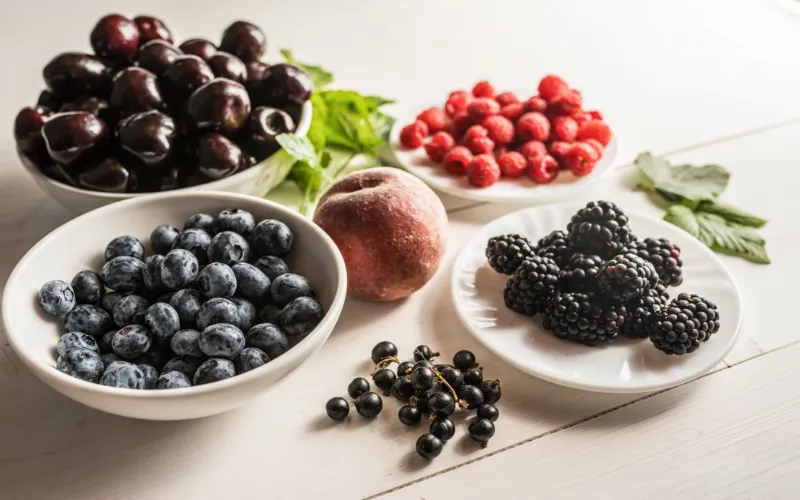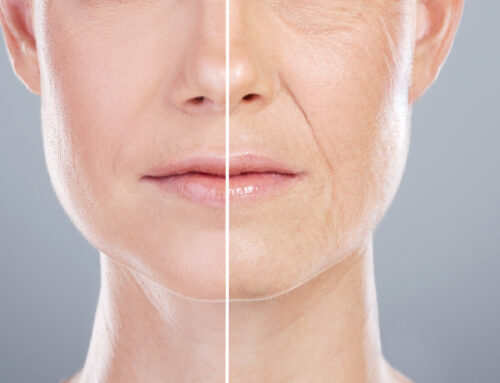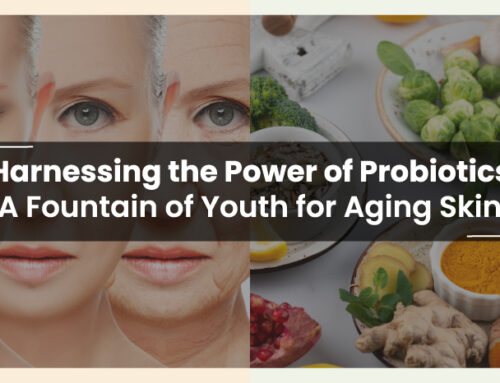Imagine savoring the intoxicating taste of nature’s bounty while harnessing youth-preserving power. Envision combating wrinkles, fine lines, and other unwelcome signs of aging simply by enjoying delicious fruits from your kitchen. Welcome to the world where food is your first defense against aging. This blog post will introduce you to sensational fruits laden with potent antioxidants, vitamins, and minerals that promise a full-flavored feast and an impactful skin rejuvenation and overall health. Brace yourself for an exciting journey towards an ageless you, one bite at a time!
Several fruits have been found to contain anti-aging properties, including watercress, red bell peppers, papaya, blueberries, broccoli, spinach, nuts (especially almonds and walnuts), avocados, sweet potatoes, and pomegranates. These fruits are rich in antioxidants, vitamins, and minerals that help repair damaged cells caused by oxidation and promote healthier skin. It’s important to eat a variety of fruits and vegetables to support overall health and wellness.
Top Anti-Aging Fruits
When it comes to maintaining youthful and glowing skin, incorporating a variety of anti-aging fruits into your diet can work wonders. These fruits are delicious and packed with essential vitamins, minerals, and antioxidants supporting healthy skin and well-being. By consuming these fruits regularly, you can help combat the signs of aging, such as wrinkles and dullness, from the inside out.
The power of anti-aging fruits lies in their ability to fight free radicals. Free radicals are unstable molecules that cause damage to our cells and accelerate the aging process. Antioxidants in these fruits neutralize these harmful molecules, preventing premature aging and promoting skin health.
Explore some of the top anti-aging fruits and discover their specific benefits for your skin and health.
Benefits of Blueberries
Blueberries are small but mighty when it comes to anti-aging properties. These vibrant berries are rich in vitamin C and packed with antioxidant compounds known as anthocyanins. This combination makes blueberries excellent for protecting the skin against oxidative stress caused by environmental pollutants, UV radiation, and other harmful factors.
Daily Delight: The Skin Benefits of Eating Blueberries
Imagine indulging in a handful of fresh blueberries every day. Not only would you satisfy your taste buds with their sweet and tangy flavor, but you would also be infusing your body with powerful nutrients. These nutrients work together to promote collagen production, essential for maintaining skin elasticity and reducing the appearance of fine lines and wrinkles.
Enhanced Circulation and Complexion from Blueberries
Furthermore, blueberries have been found to improve blood circulation, leading to enhanced oxygenation of the skin cells. This improved circulation helps deliver vital nutrients to the skin while removing toxins, resulting in a clearer complexion and healthier-looking skin.
Easy Integration of Blueberries in Your Diet
Incorporating blueberries into your diet is incredibly easy. You can enjoy them as a snack or add them to smoothies, yogurt, or oatmeal for extra flavor and nutrition. By doing so, you can harness the anti-aging benefits of blueberries and support your skin’s health from within.
Learn More: Can Pickles Enhance Gut Health?
The Power of Papaya
Papaya, also known as the “fruit of angels,” is a tropical fruit that delights your taste buds and shows your skin with numerous benefits. Bursting with nutrients and enzymes, papaya offers a natural solution for promoting youthful-looking skin and overall health.
Starting Your Day with Papaya: A Skin Health Boost
Imagine starting your day with a refreshing bowl of freshly cut papaya – the vibrant orange hue, the sweet and tangy flavor, and the juicy texture. Little do you know that this delicious fruit is working wonders on your skin from within.
Papaya’s Secret Ingredient: Papain for Skin Health
One of the key components in papaya is an enzyme called papain. This powerful enzyme aids in exfoliation by gently removing dead skin cells, leaving your skin smoother and more radiant. Bye-bye, dull complexion! Additionally, papain has anti-inflammatory properties that can calm irritated skin and reduce acne breakouts.
Vitamins and Antioxidants in Papaya: Collagen Boosters
But that’s not all – papaya is also packed with essential vitamins and antioxidants. It is especially rich in vitamin C, which plays a vital role in collagen production. Collagen is responsible for maintaining the elasticity and firmness of our skin, thus reducing the appearance of fine lines and wrinkles. Regularly consuming papaya can support your body’s natural collagen synthesis process and enjoy supple, youthful-looking skin.
Papaya: A Vitamin A Powerhouse for Healthy Skin
Furthermore, papaya contains significant amounts of vitamin A, another essential nutrient for healthy skin. Vitamin A helps regulate cellular turnover, promoting a more balanced complexion and aiding in the healing process of damaged skin. Thanks to its high water content and hydrating properties, papaya also helps moisturize your skin from the inside out.
Enjoying Papaya: A Delicious Path to Radiant Skin
Whether you enjoy eating it ripe or incorporating it into smoothies, salads, or even salsas, adding papaya to your diet can be a game-changer for achieving healthier-looking skin. So why not indulge in the power-packed goodness of this tropical fruit and let your skin glow with vitality?
Learn More: Greens for Gut Health: Top 10 Vegetable and Fruits Picks
Avocado Antioxidant Affluence
Avocados have risen to superstar status over the past few years, and it’s no wonder why. These creamy and versatile fruits offer a wealth of health benefits, including being a powerhouse for promoting skin radiance and combating the signs of aging.
The Joy of Eating Avocado: Delicious and Nutritious
Picture yourself slicing a perfectly ripe avocado, revealing its luscious green flesh. Whether you enjoy it on toast, in salads, or as guacamole, you’re in for a treat – both for your taste buds and skin.
Avocados: A Source of Skin-Protecting Antioxidants
The key to avocados’ anti-aging prowess lies in their rich content of antioxidants. These compounds help combat free radicals that can damage skin cells and accelerate aging. In particular, avocados are a fantastic source of vitamin E, which is known for its ability to nourish and moisturize the skin. Vitamin E also helps protect against sun damage by acting as a natural sunscreen.
Nutrients in Avocados: Supporting Collagen and Skin Health
Moreover, avocados contain other beneficial nutrients that contribute to healthier-looking skin. They provide ample amounts of vitamins K, C, and A – essential for maintaining skin health and supporting collagen production. Collagen is the protein responsible for maintaining the structure and elasticity of our skin, helping reduce the appearance of fine lines and wrinkles.
But let’s remember the healthy fats found in avocados. These monounsaturated fats contribute to smooth and supple skin and aid in nutrient absorption. When combined with various plant compounds such as carotenoids and flavonoids found in avocados, these healthy fats work synergistically to maximize their benefits.
As you savor each creamy bite of avocado, remember that these nutrient-dense fruits are doing wonders for your skin from the inside out. By incorporating avocados into your daily diet, you’re nourishing your body with the essential tools to maintain youthful-looking skin and promote overall health.
Learn More: Hormonal Imbalance Reasons: Understanding the Causes
Nutrient Profiles of Anti-Aging Fruits
Eating a balanced diet that includes a variety of fruits is beneficial for our overall health and plays a pivotal role in maintaining youthful-looking skin. Let’s explore the nutrient profiles of some popular anti-aging fruits and understand how they contribute to promoting healthy skin.
Watercress: A Natural Skin Antiseptic
Starting with watercress, this hydrating leafy green is an excellent internal skin antiseptic as it increases circulation and is rich in vitamins A and C. These vitamins are essential for collagen production, which helps maintain skin elasticity.
Red Bell Peppers: Antioxidant-Rich for Sun Protection
Red bell peppers contain antioxidants called carotenoids, which protect the skin from sun damage and pollution. They are also a great source of vitamin C, necessary for collagen synthesis and brightening the complexion.
Papaya: Natural Exfoliant for Radiant Skin
Papaya contains an enzyme called papain, known for its exfoliating properties. It aids in shedding dead skin cells and has anti-inflammatory benefits, making it ideal for gentle exfoliation without irritating the skin.
Imagine waking up to fresh, glowing skin after using a papaya-based face mask the night before. The enzymes work to reveal smoother and more radiant skin.
Blueberries: Anthocyanin-Packed Youthful Boost
Blueberries are packed with vitamin C and antioxidants known as anthocyanins. These compounds help protect the skin from damage caused by free radicals, reducing the signs of aging.
Broccoli: Superfood for Skin Health
Broccoli is not just a superfood for overall health but also has impressive benefits for the skin. It’s loaded with vitamins C and K, antioxidants that fight against free radicals, as well as fiber, folate, lutein, and calcium. Vitamin C in broccoli promotes collagen production, aiding in maintaining firm and supple skin.
Spinach: Hydration and Radiance Promoter
Spinach deserves a prominent spot on your plate if radiance is what you seek. Why? Because it’s super hydrating and rich in vitamins A, C, E, K, magnesium, plant-based iron, and lutein. Vitamin A promotes a healthy scalp and may contribute to shiny hair.
Imagine enjoying a delicious spinach salad regularly and noticing the added shine and vitality in your hair. Spinach truly works its magic from within!
Nuts and Almonds: Vitamin E-Rich Skin Protectors
Nuts, especially almonds, are a great source of vitamin E, which helps repair skin tissue and protect against UV rays. Conversely, walnuts contain omega-3 fatty acids that support healthier skin by reducing inflammation and maintaining moisture levels.
Avocados: Fatty Acids for Moisturized Skin
Avocados are often hailed as a beauty food due to their high content of fatty acids. These healthy fats promote smooth skin by moisturizing it from within. Avocados also contain vitamins K, C, E, A, B vitamins, and potassium – all essential for maintaining healthy skin.
Sweet Potatoes: Beta-Carotene for Skin Elasticity
Sweet potatoes offer more than just comfort in their taste; they also benefit the skin. Sweet potatoes are high in beta-carotene (which converts to vitamin A) and help restore skin elasticity. Additionally, they contain vitamins C and E that further contribute to overall skin health.
Pomegranates: Collagen-Preserving Antioxidants
Feasting on pomegranates introduces your body to abundant vitamin C and antioxidants that protect against free radical damage. The antioxidant compounds called punicalagins found in pomegranates also help preserve collagen, making for younger-looking skin.
Learn More: Probiotics for Constipation Relief: Improving Gut Health Naturally
Key Vitamins and Minerals
Antiaging fruits’ key vitamins and minerals are crucial in maintaining healthy skin. Let’s examine some of these essential nutrients:
Vitamin A: Essential for Cell Turnover
Vitamin A is widely recognized for its role in promoting good vision, but it is also vital for our skin’s health. It regulates cell turnover and supports sebum production, an oily substance that moisturizes our skin.
Vitamin C: Collagen Synthesis and Skin Brightening
Vitamin C is a powerhouse nutrient when it comes to skin health. It aids in collagen synthesis, brightens the skin tone, and protects against damage caused by free radicals. While many anti-aging fruits are rich in vitamin C, some particularly stand out due to their high content, such as watercress, red bell peppers, and blueberries.
Vitamin E: Antioxidant Protection Against UV Damage
Vitamin E is a potent antioxidant that helps protect our skin from oxidative stress caused by environmental factors like UV radiation. It also aids in cell regeneration and repair.
Imagine applying a skincare product enriched with vitamin E after spending an entire day under the sun. The antioxidant properties of vitamin E would assist in neutralizing the harmful effects of UV rays, reducing inflammation, and promoting skin healing.
Zinc: Supporting Skin Growth and Repair
Zinc is a mineral necessary for maintaining healthy skin through its impact on cell growth and repair. It aids in wound healing and can contribute to controlling acne breakouts.
Selenium: Antioxidant for Reducing Inflammation
Selenium is another essential mineral known for its antioxidant properties. It helps protect the skin against damage caused by free radicals and reduces inflammation.
Learn More: 5 Proven Ways to Slow Down Digestion Effectively
Antioxidant Compound Content
Incorporating antioxidant-rich fruits into your diet is key when combating aging and promoting youthful skin. These fruits are packed with compounds that help neutralize harmful free radicals in the body, which can cause cellular damage and accelerate aging. Explore some of the top anti-aging fruits and their impressive antioxidant compound content.
Blueberries: A Vitamin C Powerhouse
One such fruit is blueberries. These small but mighty berries are rich in vitamin C and contain the antioxidant anthocyanin, known for its protective effects against skin damage caused by sun exposure and pollution. Including blueberries in your diet can help minimize oxidative stress and promote healthier, more resilient skin.
Pomegranate: The Anti-Aging Marvel
Another powerful ally in your fight against aging is pomegranate. Packed with vitamin C and an abundance of antioxidants, including punicalagin, pomegranates have been shown to exhibit significant anti-inflammatory and anti-aging properties. Consuming pomegranates regularly can help protect collagen, improve skin elasticity, and enhance overall skin health.
Strawberries: Collagen-Boosting Delights
Strawberries also deserve a spot on your anti-aging fruit list. Not only are they deliciously sweet, but they also offer a wealth of benefits for your skin. Strawberries contain a high amount of vitamin C, which supports collagen production and aids in maintaining firmness and elasticity.
Now that we’ve explored some of the top anti-aging fruits and their antioxidant compound content let’s discuss how to incorporate them into your daily diet.
Incorporating Anti-Aging Fruits into Your Diet
Incorporating anti-aging fruits into your diet doesn’t have to be complicated or overwhelming. Following a few simple strategies ensures you’re reaping the maximum benefits of these nutrient-dense powerhouses.
Color Diversity in Fruit Selection
Firstly, start by diversifying your fruit selection to include a variety of colors. Different-colored fruits often indicate different sets of antioxidants and phytochemicals, each with its unique benefits. So, opt for a rainbow of fruits ranging from vibrant oranges in apricots and oranges to deep purples in grapes and plums.
Seasonal Fruit Consumption
Secondly, aim to consume fruits that are in season. Not only will seasonal fruits be fresher and taste better, but they can also be more affordable. Consider visiting local farmers’ markets or joining a community-supported agriculture (CSA) program to access your area’s freshest and most diverse range of fruits.
For instance, indulge in juicy watermelons and refreshing berries like strawberries and blackberries during the summertime. In contrast, winters may offer citrus fruits like oranges and grapefruits rich in vitamin C to support your skin health even during the colder months.
Creative Incorporation in Meals
Lastly, find creative ways to incorporate anti-aging fruits into your meals and snacks throughout the day.
Choosing Quality Fresh vs Frozen Fruits
When it comes to incorporating fruits into your diet, the choices can seem overwhelming. Should you go for fresh fruits or opt for the convenience of frozen ones? Both options have their own merits and drawbacks. Let’s explore the factors to consider when choosing fresh and frozen fruits.
Fresh Fruits: Vibrancy and Natural Goodness
Fresh fruits are often associated with a sense of vibrancy and natural goodness. They are picked at their peak ripeness, offering optimal flavors and textures. Picking fresh fruits from a local farmer’s market or grocery store can be quite an experience. The vibrant colors, enticing aromas, and the ability to touch and examine each fruit can be a sensory delight.
Selection Tips for Fresh Produce
However, there are some aspects to consider while selecting fresh produce. Go for firm fruits yet yield slightly to gentle pressure, indicating that they are ripe but not overripe. Examine them closely for any signs of damage or spoilage. Check for blemishes, bruises, or mold that might affect the taste and nutritional value of the fruit.
Frozen Fruits: Convenience and Nutritional Integrity
On the other hand, frozen fruits provide convenience without compromising nutritional value. These fruits are often picked at their peak ripeness and immediately flash-frozen to preserve their nutrients and flavors. The freezing process halts deterioration, allowing you to enjoy your favorite fruits throughout the year, regardless of seasonality. They are readily available, require no preparation time, and can be stored for extended periods.
Sometimes, our busy lifestyles make it challenging to go shopping regularly or use up fresh fruits before they spoil. Frozen fruits come to the rescue, ensuring we always have a supply of nutritious options.
Choosing High-Quality Frozen Fruits
While frozen fruits’ convenience is undeniable, choosing quality products is crucial. Look for individually quick-frozen fruits (IQF), as this technique prevents them from clumping together and makes grabbing only as much as you need easier. Check the packaging for any signs of freezer burn or ice crystals, indicating improper storage or extended shelf life.
Fresh vs. Frozen Fruits: A Personal Choice
Choosing between fresh and frozen fruits is akin to deciding between a leisurely walk through the countryside to pick your berries or having a bag of perfectly ripe berries at your disposal in the depths of winter when fresh ones are scarce. Both options offer their unique benefits depending on your circumstances and priorities.
When it comes down to it, the choice between fresh and frozen fruits ultimately depends on personal preference, lifestyle, and availability. Opting for fresh fruits allows for a sensory experience while supporting local farmers and enjoying peak flavors. On the other hand, frozen fruits offer convenience, year-round accessibility, and longer shelf life without compromising nutritional value.
Nutritional Value of Fresh and Frozen Fruits
It’s worth noting that freezing doesn’t significantly diminish the nutrient content of fruits. Frozen fruits can be just as rich in vitamins, minerals, and antioxidants as their fresh counterparts. Their versatility extends beyond snacking; they can be used in smoothies, baked goods, sauces, and more.
To maximize the benefits of fresh and frozen fruits, consider incorporating a mix of both into your diet. Enjoy the seasonal delights of fresh fruits when they are abundantly available, and embrace the convenience and variety frozen ones offer during other times. Ultimately, what matters most is making nutritious choices that align with your preferences and support your overall health and well-being.




